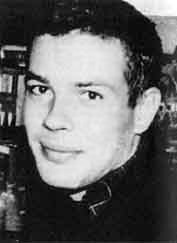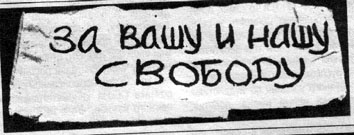| Revision as of 07:27, 16 July 2006 editGhirlandajo (talk | contribs)Autopatrolled, Extended confirmed users, Pending changes reviewers89,629 edits →External links: rmv misleading, duplicative cats← Previous edit | Revision as of 07:49, 16 July 2006 edit undoJbhood (talk | contribs)324 edits update link to Chronicle of Current EventsNext edit → | ||
| Line 32: | Line 32: | ||
| In June 1968 Delaunay returned to Moscow. On ] ] Delaunay and the other seven dissidents organized the now famous demonstration in support of the ] on ] near the ]. He and ] we actually holding the famous banner with the words "ЗА ВАШУ И НАШУ СВОБОДУ" (For Your and Our Freedom). Seven people were arrested, in court Delaunay stated that the five minutes of freedom on the square are worth the years in prison that were probably awaiting him. Delaunay was sentenced to 2 years and 10 months in a labor camp that he served in ] in North-Western ]. | In June 1968 Delaunay returned to Moscow. On ] ] Delaunay and the other seven dissidents organized the now famous demonstration in support of the ] on ] near the ]. He and ] we actually holding the famous banner with the words "ЗА ВАШУ И НАШУ СВОБОДУ" (For Your and Our Freedom). Seven people were arrested, in court Delaunay stated that the five minutes of freedom on the square are worth the years in prison that were probably awaiting him. Delaunay was sentenced to 2 years and 10 months in a labor camp that he served in ] in North-Western ]. | ||
| In June 1971 Delaunay finshed serving his sentence and returned to Moscow. In 1973 his wife I. Belgorodkaya was arrested as a participant in an underground journal ] (Хроника Текущих Событий). In 1975 she was freed and they both emigrated to ]. In 1979 Delaunay published his story ''Portraits in the Barbed Frame'' in the magazine ''Echo''. | In June 1971 Delaunay finshed serving his sentence and returned to Moscow. In 1973 his wife I. Belgorodkaya was arrested as a participant in an underground journal ] (Хроника Текущих Событий). In 1975 she was freed and they both emigrated to ]. In 1979 Delaunay published his story ''Portraits in the Barbed Frame'' in the magazine ''Echo''. | ||
| On ] ] Delaunay died of a ]. In 1984 his book of poetry ''Verses: 1963-1983'' was published. In the same year he was posthumously awarded the ] prize. His poetry has been published in Russia since 1989. | On ] ] Delaunay died of a ]. In 1984 his book of poetry ''Verses: 1963-1983'' was published. In the same year he was posthumously awarded the ] prize. His poetry has been published in Russia since 1989. | ||
Revision as of 07:49, 16 July 2006

Vadim Nikolaevich Delaunay (or Delone, Template:Lang-ru; 1947-1983) was a Russian poet and dissident.
Vadim Delaunay was born to a Russian-French family of the Soviet Intelligentsia. His grandfather, Boris Delaunay was a prominent Soviet mathematician, the author of the Delaunay triangulation, among his ancestors was marquis Bernard-René de Launay, the last governor of the Bastille, murdered by the atackers on that castle. Vadim often predicted that he would repeat the fate of his ancestor.
- Пуcкай грехи мне
- не простят -
- К тому предлогов слишком много,
- Но если я просил
- у Бога,
- То - за других,
- не за себя.
- Let my sins
- be not forgiven
- the reasons for this are many
- but if I prayed
- my God for something
- that was for others
- never for myself
Vadim Delaunay
Vadim studied in Moscow matshkola N2, one of the best in the country at that time, then at the Department of Philology at Moscow Pedagogical Institute. As a student, he also worked as a freelance author for the Literaturnaya Gazeta.
Vadim started to write poetry at the age 13. His poetry was distributed by samizdat, some were published abroad. On January 22 1967 he took part in a demonstration on Pushkin Square protesting the arrest of Alexander Ginzburg and Yuri Galanskov and against articles 70 and 190 of the Soviet Penal Code - Anti-Soviet agitation and Libel against the Soviet Government. Delaunay was arrested and given a one year suspended sentence (incidently just according to article 190 of the Penal Code). His sentence was much lighter than that of another organizer of the same meeting, Vladimir Bukovsky, who got three years in a Labor camp. Vadim was distressed by the difference in the sentence, explaining the relative softness of it by the influence of his relatives.
Vadim's sentence required him to move away from Moscow, so he went to Novosibirsk State University to a friend and pupil of his grandfather, Aleksandr Danilovich Aleksandrov. In Novosibirsk he continued his philology studies and wrote poetry. At that time there were his first official foreign publications in the Paris magazine Grani N66. Vadim was an organizer of a concert by the Bard Alexander Galich, who was semi-legal to that time. In the beginning of 1968 after the court hearing on Galanskov and Ginzburg Delaunay wrote an open letter to Literaturnaya Gazeta where he praises the bravery of those people. The letter was published in the New York newspaper Novoe Russkoe Slovo.

In June 1968 Delaunay returned to Moscow. On August 25 1968 Delaunay and the other seven dissidents organized the now famous demonstration in support of the Prague Spring on Red Square near the Moscow Kremlin. He and Pavel Litvinov we actually holding the famous banner with the words "ЗА ВАШУ И НАШУ СВОБОДУ" (For Your and Our Freedom). Seven people were arrested, in court Delaunay stated that the five minutes of freedom on the square are worth the years in prison that were probably awaiting him. Delaunay was sentenced to 2 years and 10 months in a labor camp that he served in Tyumen Oblast in North-Western Siberia.
In June 1971 Delaunay finshed serving his sentence and returned to Moscow. In 1973 his wife I. Belgorodkaya was arrested as a participant in an underground journal Chronicle of Current Events (Хроника Текущих Событий). In 1975 she was freed and they both emigrated to France. In 1979 Delaunay published his story Portraits in the Barbed Frame in the magazine Echo.
On 13 June 1983 Delaunay died of a heart attack. In 1984 his book of poetry Verses: 1963-1983 was published. In the same year he was posthumously awarded the Vladimir Dal prize. His poetry has been published in Russia since 1989.